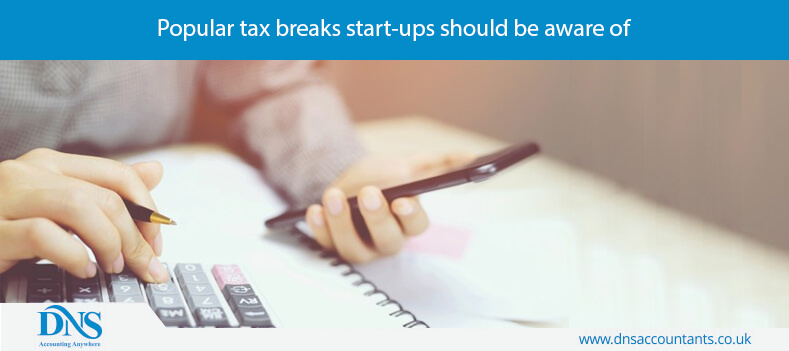Nobody wants to pay more than required in taxes. And, while the tax system contains numerous deductions and credits, many of them go unclaimed at tax time. If you are a sole trader, contractor, freelancer or a small business owner, or any other professional looking for ways to reduce your tax burden, you should be aware of the six missed and popular tax breaks as a start-up. This blog will talk about popular tax breaks for which you could go as a start-up and help you reduce your tax liability.

What is a Tax break?
A tax break is a reduction in the total tax liability of a taxpayer. Additionally, the word is used to refer to any class of people receiving preferential tax treatment in the United Kingdom. If the government provides a tax break to a certain group of individuals or kind of corporations, it either reduces the amount of tax they would have to pay otherwise or modifies the tax system in their favour.
Importance of Tax breaks
A tax break can significantly reduce a taxpayer's taxable income. A tax deduction, a tax credit, or a tax exemption could be used for tax savings. Tax breaks are the most preferred way to boost the economy by raising the money taxpayer's required to spend or the money businesses required to invest in their growth.
-
Tax Deduction
– A tax deduction reduces the amount of taxable income. You deduct the amount of tax deduction from your income, which lowers down your taxable income. Less the taxable income, smaller the tax bill. -
Tax Credit
– A tax credit offsets the taxpayer’s liability on a pound-for-pound basis. This has a higher impact than a deduction, which merely reduces taxable income. In effect, a tax credit is applied to the taxpayer's tax liability after all deductions from taxable income are made. -
Tax exemption
- An exemption covers a specific amount or type of income from taxation.
Also See: Home Office Tax Deductions
Popular Tax breaks you must be aware of
-
R&D Tax credits
– Even if you believe your business does not qualify for this tax credit, it is still worth looking more and maybe contacting R&D tax credit experts for advice. Even if your small firm is making losses, you may be eligible for R&D tax benefits. According to the HMRC's broad definition of a tax credit, you do not have to engage in laboratory work to qualify for this benefit. As a result of this incentive, software developers, architects, and a various other professionals have all successfully claimed R&D tax relief. -
Annual investment allowance
– As a small business owner, you must make use of Annual Investment Allowance (AIA) to claim 100% tax relief on any assets that qualify as machinery and plant in the first year of its purchase. The criteria for these assets are fairly stringent; therefore, you should ensure that your business qualifies. For instance, company cars are not included on the list. Additionally, you must choose which assets you must own as a small business owner prior to leasing them. -
Capital allowance
- During the Coalition administrations tenure, the government created this scheme to encourage the use of energy-efficient equipment. According to the current government policy, you can take advantage of this tax break if you utilise low-emission vehicles, water-saving equipment, and a variety of other energy-saving products. -
Seed enterprise investment scheme (SEIS)/Enterprise investment scheme (EIS)
– A business that is just getting started and requires more funding but does not like to approach a bank could take advantage of this scheme, which provides considerable tax breaks to potential investors.The Enterprise Investment Scheme is another similar tax advantage that encourages potential investors to fund the growth of your SME (EIS). This scheme benefits all small and medium-sized businesses, not only start-ups. Simply because of the income and capital gains tax benefits, this is an attractive proposition for potential investors. Caution should be exercised to ensure that investors receive tax relief by adhering to a strict application process and obtaining proper permission from HMRC for any schemes.
-
Structures and Buildings allowance
– The Structures and Buildings Allowance was introduced a few years ago to broaden the scope of tax relief available for plants and machinery to include other components of a non-residential building or structure. The relief was given at a flat rate of 2% for 50 years. The Finance Act 2020 increased the rate to 3% on 1 April 2020. As a result, the period required to repay qualifying expenditures will be decreased from 50 years to 33 and four months. SBA can be claimed on both UK and foreign properties if the business is subject to UK tax.
The SBA is a welcome opportunity for tax relief; it is subject to complex regulations about its interaction with other capital allowances provisions and chargeable gains. To qualify for relief, businesses must do a thorough cost analysis and segregation and comply with stringent administrative requirements.
-
Employment allowance
- Employment Allowance reduces annual National Insurance liability for eligible employers by up to £4,000. You'll pay less employers Class 1 National Insurance on each payroll run until the £4,000 is exhausted or the tax year ends (whichever is sooner). Each tax year, you could claim up to £4,000 against your employers Class 1 National Insurance liability. If your liability was less than £4,000 per year, you could still claim the allowance. Note that you cannot claim the allowance if your business has only one employee/director and Contractors and freelancers who are self-employed and pay Class 2 and Class 4 National Insurance, but not Class 1.
If you have any queries or want specialist advice on tax deductions, tax credits or tax exemptions you can avail to reduce your tax liability, kindly call DNS Accountants on 03330886686, or you can also e-mail us at enquiry@dnsaccountants.co.uk
Disclaimer : - "This article was correct at the date of publication. It is intended for general purposes only and does not constitute legal or professional advice. Independent professional advice should be sought before proceeding with any transaction".
Any questions? Schedule a call with one of our experts.








